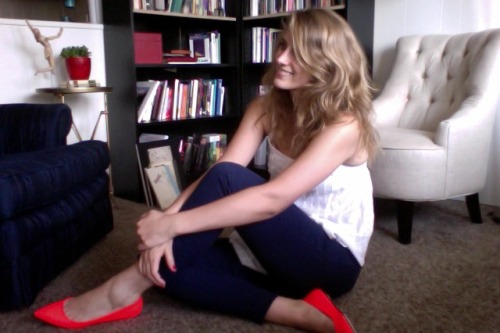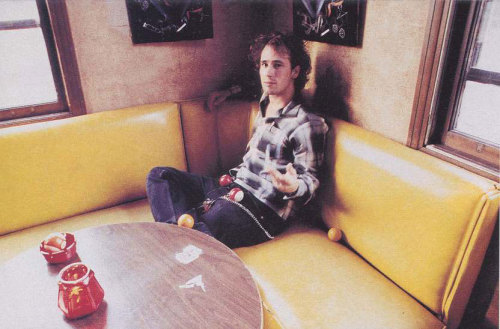 BOOKS
BOOKS In Which We Unwrinkle The Nature Of Time
 Friday, August 10, 2012 at 12:00PM
Friday, August 10, 2012 at 12:00PM 
A Small Crease
by KARA VANDERBIJL
Twenty-six publishers rejected A Wrinkle in Time between 1960 and 1962. When a mutual friend offered to introduce Madeleine L’Engle to John Farrar of Farrar, Straus & Giroux, the house that would eventually publish her manuscript, she was so disheartened by the whole process that she initially refused.
It was too strange, they all said, too frightening, too complex for children to appreciate. And then there was the matter of the frank talk of teenagers kissing and the witches and the interplanetary travel. Not suitable at all. When the novel won the Newberry Medal in 1963, many of the same editors came up to L’Engle and said, “I wish you would have brought the manuscript to me!” She reminded them gently that she had.
Some of Wrinkle’s strength must be attributed to those who rejected it; the editors had certainly not glossed over its more puzzling attributes, and I believe it remains in print precisely because it is not easy to swallow. Three children, one of whom is actually a genius, follow a bizarre pack of magical neighbors across the fabric of space to save a missing parent and combat the darkness that is slowly encompassing the world? And when evil finally does pull back, it is because of love, not as a result of a great intergalactic war? And it all begins, cheekily, with, “It was a dark and stormy night”?

Thankfully in the 1960s those well-meaning, floral-printed matrons already existed, surely the same ones as warned my mother in the early millennium against allowing my brother and I to read Harry Potter, who now took it upon themselves to rail against the story in Sunday School. Not only did L’Engle suggest that there were worlds beyond our own, but she listed Jesus in the same list as the Buddha! The horror! In faraway labs, the white coats looked up from their petri dishes to sigh at the smallness of the author’s mind. Who could approach scientific fact with such naive mysticism? The woman could not be taken seriously.
But Madeleine hadn’t written it for any of them; she had written it for children.
Before I picked up the novel again this year, I could not remember if I had read it before, for reasons that soon became clear: first, any magic in the book stems from the absolutely ordinary. One almost wants to laugh, “Really, Madeleine? How quaint! This is the best you can do?” Children just move through time? What are the mechanics of that? They are left to the imagination, which she has no qualms asking us to use. Second, her characters are unselfconscious – not in the sense that they have no awareness of who they are or what they must do – but any problem that is inside of them is worked out between them relationally, or in the plot itself.
The gist is simple: Dr. Murry, a renowned physicist, has disappeared, leaving his wife and four children - Meg, Charles Wallace, Sandy and Dennys - sick with worry. Not to mention that he had been in the middle of some very important and controversial research about the space/time continuum. One night, the family’s strange neighbor, Mrs Whatsit, confides in the Murrys that their father had discovered something called a tesseract, a mysterious means of traveling between one dimension and another. Meg and Charles Wallace, along with their friend Calvin O’Keefe, embark on a journey through space and time to save Dr. Murry’s life.

What begins as a dark, stormy night – romantically reflecting, of course, the fourteen-year-old protagonist Meg Murry’s anxiety over her father’s disappearance and the trouble she’s facing at school – ends in a warm kitchen over a cup of hot cocoa. Between a genius five-year old brother with whom, for all intents and purposes she should still be playing Tinker Toys and a mother who is "intimidatingly" beautiful and also a renowned scientist in her own right, Meg has all the reason in the world to feel a bit inadequate. Yet an open discussion ensues over sandwiches, each member of the family feeling at ease to share their fears. There is no boundary between adult and child. For L'Engle, who famously said that "the great thing about getting older is that you don't lose all the other ages you've been", the only boundary between two people is the boundary of their flesh, and even that can be superseded. From the outset the atmosphere is not as important as the relationships; that is L’Engle’s most subtle magic, and it is in every one of her books. Any person (not even child!) not left aching for this sort of companionable midnight snacking-and-sharing has already closed their heart.
The story, not the inner working of his or her mind, is responsible for a character’s development. I think we all know this as a literary rule, but less as a life rule. When Charles Wallace attempts to destroy the cold artificial intelligence on the dark planet of Camazotz, where Dr. Murry is being held captive, with sheer intellectual power, he is overcome. You cannot fight one way of thinking with another way of thinking unless you give it a sword or a gun or a bomb; only action forces change. Had Meg chosen to love her little brother from the safe, faraway planet to which she, Mr. Murry and Calvin eventually escape, it would have been a love of the mind, and she would not have been able to rescue him. Love, in its proper form, spirited her back – physically – to the place she feared more than anything and grew until it could cover the darkness.
Perhaps we aren’t as afraid of Camazotz as L’Engle’s original readers would have been: the threat of a giant conformist society holds little sway in a country where freedom is heralded as the greatest good. But I do shiver with Meg and Charles Wallace and Calvin as they watch the rows of similar houses and the children who, at precisely the same time, come out to bounce a ball. One of the residents, a small boy, cheerfully recites: “Everybody knows our planet has the best Central Intelligence Center on the planet. Our production levels are the highest. Our factories never close; our machines never stop rolling. Added to this we have five poets, one musician, three artists, and six sculptors, all perfectly channelled... we are the most oriented city on the planet.” The idea of a giant disembodied brain ruling over and regulating people does not frighten me. But when we fall into ever-narrowing categories of existence, when we resort to hatred and cynicism to uphold our ideals no matter which side of the political, religious, or sociological spectrum we sit on, my heartstrings give a painful tug.

What happens to us as adults finds inevitable roots in what we experienced as children – that is why stories about adults are actually stories about fate, and children’s stories are always and only about choice. It is very simple to confuse the two, to forget that we have progressively lost our freedom, as we’ve grown older, instead of gaining it. What gaps there are in space and time narrow slowly until our days are a sequence, each one hanging on the one before:
(I went to the bar today because it was such a terrible day at the office. I met somebody. I gave him my phone number, because he reminded me of a boy I knew in high school and of a man I dated three years ago. Today I’m nursing a hangover and waiting for him to call. He will call tomorrow because he would not call only a few hours after we met. In two years we will be living together, in four we’ll be married. One day I will wake up and I will tell myself I do not know how I got here, when really, what I’m saying is I do not know how I did not get anywhere else.)
“You have to write the book that wants to be written,” said Madeleine. “And if the book will be too difficult for grown-ups, then you write it for children.”
What is a children’s book? It is a potential life. It is a fantasy in which the child is allowed to imagine the outcome of any choice he or she might make. It is not an instruction manual or a moral guide or a form of escape. It is a wrinkle, a mysterious vehicle by which a parallel existence might be explored.

Grown, I am so much more resistant to paradox, although I should be more open to it — hasn’t my experience amply proved that multiple things can be true at once, without any part of one excluding any part of the other? I am fully body and fully mind and fully heart. I may believe I am justified in censoring one part with which I do not want to define myself or my generation. But to dull one in favor of another is to forget why all are required.
When I hear a friend say, “I cannot believe that in 2012, we are still dealing with this intolerance,” I think, of course we are still dealing with this intolerance. This intolerance is a piece of our potential reality, if only by which to see other pieces, and is thus absolutely, awfully necessary. We are free struggling beasts with very little in the way of love. We are still exploring. What gaps there are in space and time have not yet fully narrowed.
Kara VanderBijl is the senior editor of This Recording. She is a writer living in Chicago. She last wrote in these pages about what you might read on a fashion blog. She tumbls here and twitters here.

"Human Being" - Cat Power (mp3)
"Silent Machine" - Cat Power (mp3)
The new album from Cat Power is entitled Sun, and it will be released on August 31st.















































